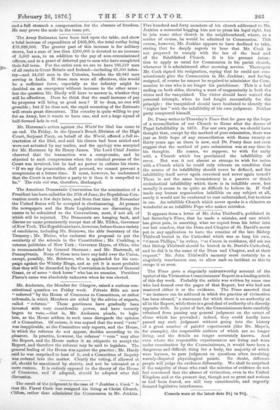Dr. Pusey writes to Thursday's Times that he gave up
the hope of a reconciliation of our Church to Rome after the decree of Papal Infallibility in 1870. For our own parts, we should have thought that, except by the method of pure submission, there was just as little hope of any reconciliation with Rome twenty or thirty years ago as there is now, and Dr. Pusey does not even suggest that the method of pure submission was at any time in his thoughts. He ceases, we suppose, to wish for unity with a Church which has proclaimed the infallibility of error. But was it not almost as strange to wish for union with a Church which he could only tolerate on condition that the source of its infallibility should never be defined, and the infallibility itself never again exercised and never again tested? There is not the same inconsistency in a passive or dumb ecclesiastical infallibility which there is in infallible error, but morally it seems to us quite as difficult to believe in. If God made any human organisation infallible on any subject at all, surely it would not be conferred to rust unburnished, but to shine in use. An infallible Church which never speaks is a chimaera as wonderful as an infallible Pope who makes mistakes.


































 Previous page
Previous page